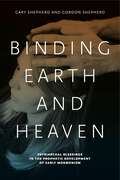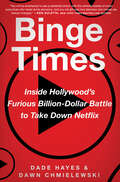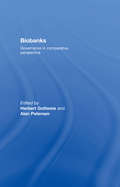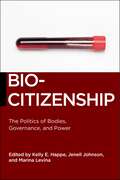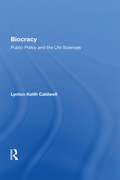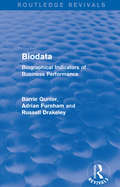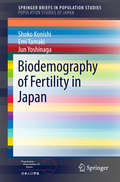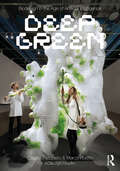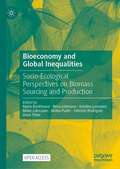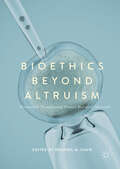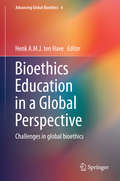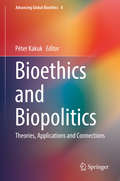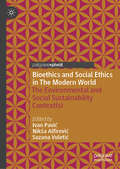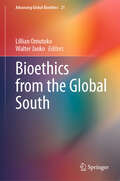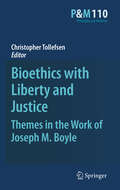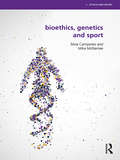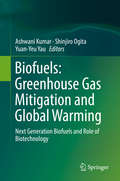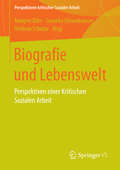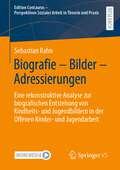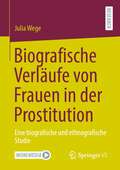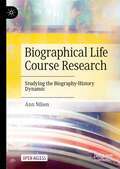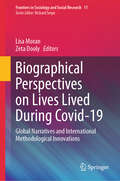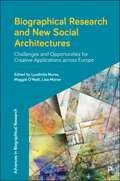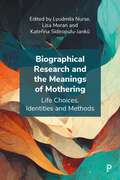- Table View
- List View
Binding Earth and Heaven: Patriarchal Blessings in the Prophetic Development of Early Mormonism
by Gary Shepherd Gordon ShepherdIn Binding Earth and Heaven, Gary Shepherd and Gordon Shepherd use early nineteenth-century Mormonism as a case study to examine questions about how new religious movements may, as rare exceptions, survive and even eventually become successful in spite of intense opposition. Initial scorn and contempt for Mormonism—the fledgling creation of the young Joseph Smith—quickly elevated to mob violence as both Smith’s innovative teachings and converted followers proliferated, resulting in the widely held perception that the Mormons constituted a social menace. This book examines how Mormonism attracted and maintained the loyalty of increasing numbers of people despite mounting hostilities and severe hardships. The book focuses on the unique Mormon ritual (and accompanying doctrinal underpinnings) of “patriarchal blessings.” Patriarchal blessings were an innovative adaptation of the Old Testament practice of fathers making quasi-legal pronouncements over the heads of their sons—a way of verbally conferring rights, promises, admonition, and guidance to heirs. Binding Earth and Heaven shows how the organizational complexities of this practice contributed to strengthening and sustaining member faith and fealty, thereby bolstering the continuity and development of Mormonism.
Binge Times: Inside Hollywood's Furious Billion-Dollar Battle to Take Down Netflix
by Dade Hayes Dawn ChmielewskiThe first comprehensive account of the biggest wake-up call in the history of the entertainment business: the pivot to streaming. Go inside a disparate group of media and tech companies -- Disney, Apple, AT&T/WarnerMedia, Comcast/NBCUniversal and well-funded startup Quibi – as they scramble to mount multi-billion-dollar challenges to Netflix.After spotting Netflix and the deep-pocketed Amazon Prime Video a decade’s head start, rivals from the tech and start-up realm (Apple, Quibi) and traditional media (Disney, WarnerMedia, NBCUniversal) all decided to move mountains to enter the streaming game. At a cost of billions, each went after their own piece of the market, launching five new services in a seven-month span. And just as the derby was heating up, the coronavirus pandemic arrived, a black-swan event bringing short-term benefits but also stiff challenges.The battle for streaming supremacy may end up having more than one winner, but the cost and disruption to decades-old business models have also produced a lot of losers. Binge Times reveals the true costs of the vision quest as companies are turned inside-out and repeatedly redraw their org charts and strategic plans. Stretching from Silicon Valley to Hollywood to Wall Street, it is a mesmerizing, character-rich tale of hubris and ambition, as the fate of a century-old industry hangs in the balance.
Biobanks: Governance in Comparative Perspective
by Alan Petersen Herbert GottweisIn recent years, a number of large population-based biobanks - genetic databases that combine genetic information derived from blood samples with personal data about environment, medical history, lifestyle or genealogy - have been set up in order to study the interface between disease, and genetic and environmental factors. Unsurprisingly, these studies have sparked a good deal of controversy and the ethical and social implications have been widely debated. Biobanks: Governance in Comparative Perspective is the first book to explore the political and governance implications of biobanks in Europe, the United States, Asia, and Australia. This book explores: the interrelated conditions needed for a biobank to be created and to exist the rise of the new bio-economy the redefinition of citizenship accompanying national biobank developments This groundbreaking book makes clear that biobanks are a phenomenon that cannot be disconnected from considerations of power, politics, and the reshaping of current practices in governance. It will be a valuable read for scholars and students of genetics, bioethics, risk, public health and the sociology of health and illness.
Biocitizenship: The Politics of Bodies, Governance, and Power (Biopolitics #19)
by Kelly E. Happe Jenell Johnson Marina LevinaA groundbreaking exploration of biocitizenshipCitizenship has a long, complex relationship with the body. In recent years, developments in biomedicine and biotechnology, as well as a number of political initiatives, grassroots efforts, and public policies have given rise to new ways in which bodies shape the idea and practices of citizenship, or what has been called “biocitizenship.” This book, the first collection of essays on the topic of biocitizenship, aims to examine biocitizenship as a mode of political action and expand readers’ understanding of biopolitics. Organized into four distinct sections covering topics including AIDS, drug testing on the mentally ill, and force-feeding prisoners, Biocitizenship delves deep into the relationship between private and public identity, politics, and power. Composed of pieces by leading scholars from a wide variety of disciplines, Biocitizenship offers a clear and comprehensive discussion on biocitizenship, biopolitics, and groups that may be affected by this ever-growing dialogue. Authors address issues familiar to biopolitics scholarship such as gender, sexuality, class, race, and immigration, but also consider unique objects of study, such as incubators, dead bodies, and corporations. Biocitizenship seeks to question who may count as a biological citizen and for what reasons, an essential topic in an age in which the body and its health provide the conditions necessary for political recognition and agency.
Biocracy: Public Policy And The Life Sciences
by Lynton Keith CaldwellBiocracy, a term invented by physiologist Walter Bradford Cannon, refers to the influence of biological science on society and its public policies. Beginning with the prophetic essay “Biopolitics: Science, Ethics, and Public Policy,†this book addresses various aspects of the relationships among the life sciences, society, and government. Included in the topics considered are some of the more critical issues of our time: the social responses to life science innovations; health and homeostasis as social concepts; the relationship between history and biology and that between the life sciences and the law; biocratic interpretations of ethical behavior and biopolitical conflicts; and the options, risks, and international consequences of biotechnology. Caldwell’s book is a collection of articles that he wrote on this subject over a period of twenty-five years. Of the ten chapters, four have previously appeared in scholarly journals but have undergone extensive editorial revisions appropriate to this publication. The remaining six chapters have been presented at various professional meetings but have not hitherto been available in print.
Biodata (Routledge Revivals): Biographical Indicators of Business Performance
by Adrian Furnham Barrie Gunter Russell DrakeleyFirst published in 1993. This book is intended for managers and occupational psychologists involved in the selection and assessment of the workforce. It details the history and development of the use of biographical data for both recruitment and promotion of employees. Grounded in relevant research literature, it offers a comprehensive analysis of the advantages and disadvantages of biodata in different contexts. It also includes examples of applications and recommendations for use, as well as examples of questionnaires. Written by experts, it represents a wide-ranging review of the contemporary research in the field. This work will be of interest to students of business and psychology.
Biodemography of Fertility in Japan (SpringerBriefs in Population Studies)
by Shoko Konishi Emi Tamaki Jun YoshinagaThis book provides a framework to break down Japanese low fertility into physiological, behavioral, and social factors, which may eventually help to understand the mechanisms of fertility change in the country. It is the first publication to summarize limited numbers of previous research projects on proximate determinants of fertility in Japan. Although a significant portion of previous studies in this field were published in Japanese, this book collects such information and introduces it to an international audience. In addition, the authors propose directions for future research required to fill the gap in this research area in Japan. By examining previous data on proximate determinants of fertility in this country in comparison to those of other countries, the book also sheds light on similarities and differences between populations in Japan and other countries in terms of fertility level and its components.
Biodesign in the Age of Artificial Intelligence: Deep Green
by Marco Poletto Claudia PasqueroBiodesign in the Age of Artificial Intelligence: Deep Green investigates the potential of nature-based technology for shaping the evolution of contemporary architecture and design. It takes on the now pervasive topic of design intelligence, extending its definition to encompass both biological and digital realms. As in their first title, Systemic Architecture: Operating Manual for the Self-Organizing City, the authors engage the topic through the specific lens of their innovative design practice, ecoLogicStudio, and their research at the University of Innsbruck and at the Bartlett, UCL. Part One of the book, entitled PhotoSynthetica™, illustrates design solutions that engage the urban microbiome and seek to achieve an immediate impact, while Part Two, entitled Deep Green, includes synthetic landscapes and operates within a much larger spatio-temporal frame, going beyond human perception and life span to envision design as a geographical and geological force. In the age of catastrophic climate change, such perceptual expansion helps to clarify that change cannot simply be stopped or rolled back. We must instead establish more positive dynamics of change within the living world. To this end, this book proposes to engage with design and architecture as an extended cognitive interface, a sentient being that is co-evolutionary and symbiotic with the living planet, contributing to its beauty and to our continued enjoyment of it.
Bioeconomy and Global Inequalities: Socio-Ecological Perspectives on Biomass Sourcing and Production
by Rosa Lehmann Anne Tittor Maria Backhouse Kristina Lorenzen Malte Lühmann Janina Puder Fabricio RodríguezThis open access book focuses on the meanings, agendas, as well as the local and global implications of bioeconomy and bioenergy policies in and across South America, Asia and Europe. It explores how a transition away from a fossil and towards a bio-based economic order alters, reinforces and challenges socio-ecological inequalities. The volume presents a historically informed and empirically rich discussion of bioeconomy developments with a particular focus on bio-based energy. A series of conceptual discussions and case studies with a multidisciplinary background in the social sciences illuminate how the deployment of biomass sources from the agricultural and forestry sectors affect societal changes concerning knowledge production, land and labour relations, political participation and international trade. How can a global perspective on socio-ecological inequalities contribute to a complex and critical understanding of bioeconomy? Who participates in the negotiation of specific bioeconomy policies and who does not? Who determines the agenda? To what extent does the bioeconomy affect existing socio-ecological inequalities in rural areas? What are the implications of the bioeconomy for existing relations of extraction and inequalities across regions? The volume is an invitation to reflect upon these questions and more, at a time when the need for an ecological and socially just transition away from a carbon intensive economy is becoming increasingly pressing.
Bioethics Beyond Altruism: Donating and Transforming Human Biological Materials
by Rhonda M ShawThis book departs from conventional bioethics approaches to consider the different moral and political economies involved in the donation and transformation of human organs, gametes, stem cells and breastmilk. Collectively, the authors draw attention to the different values associated with research and therapy on body part and tissue exchange through an examination of altruism, gift and commodity relations. They expertly discuss issues such as the bioethical conundrums around the circulation and use of human biological materials and services as well as their legal and regulatory limits, the economic benefits and health values attributed to various body parts and products, and the matter of immaterial labour and affective relations between donors, recipients and others involved in tissue provision.Based on new empirical research, this interdisciplinary collection of original and timely essays will be of interest to students and researchers in gender and cultural studies, sociology, anthropology, science and technology studies, as well as medical professionals with an interest in health and reproduction.
Bioethics Education in a Global Perspective: Challenges in global bioethics (Advancing Global Bioethics #4)
by Henk A.M.J. ten HaveThis book critically analyses experiences with bioethics education in various countries across the world and identifies common challenges and interests. It presents ethics teaching experiences in nine different countries and the basic question of the goals of bioethics education. It addresses bioethics education in resource-poor countries, as the conditions and facilities are widely different and set limits and provide challenges to bioethics educators. Further, the question of how bioethics education can be improved is explored by the contributors. Despite the volume of journal publications agreement on bioethics education is rather limited. There are only few examples of core curricula, demonstrating consensus on the contents, goals, methods and assessment of teaching programs. We need ask: How can agreement on the best modalities of bioethics education be promoted?.
Bioethics and Biopolitics: Theories, Applications and Connections (Advancing Global Bioethics #8)
by Péter KakukThis volume links three different theoretical approaches that have a common focus on the relationship between biopolitics and bioethics. This collection of papers can be categorized into different domains that are representative of the contemporary usage of biopolitics as a concept. On the one hand, several chapters develop a clear and up-to-date understanding of the primary sources of the concept and related theories of Agamben, Negri or Foucault and approach the question of relevance within the field of bioethics. Another group of papers apply the philosophical concepts and theories of biopolitics (biopower, Homo Sacer, biocitizenship) on very specific currently debated bioethical issues. Some scholars rely on the more mundane understanding of (bio)politics and investigate how its relationship with bioethics could be philosophically conceptualized. Additionally, this work also contains papers that follow a more legally oriented analysis on the effects of contemporary biopolitics on human rights and European law. The authors are philosophers, legal scholars or bioethicists. The major strength of this volume is to provide the reader with major insights and orientation in these different contemporary usages of the concept and theories of biopolitics, within the context of its various ethically relevant applications.
Bioethics and Social Ethics in The Modern World: The Environmental and Social Sustainability Context(s)
by Nikša Alfirević Ivan Pavić Suzana VuletićThis book explores the philosophical analysis of attitudes and values and sustainable behaviors in fields such as healthcare, social sciences, economics in the context of environmental studies. It firstly investigates the fundamental concept of bioethics with relevant case studies related to the issues of human life and preservation of dignity. The authors then move on to discuss the application of (bio)ethical principles in contemporary society and within the market economy. The last part of the book brings together a variety of perspectives on the general philosophical and ethical foundations of sustainable behavior based on the idea of human dignity. This book offers a guide to understanding responsible sustainability practices in various fields, while considering the social benefits and economic effectiveness of sustainable behaviors.
Bioethics from the Global South (Advancing Global Bioethics #21)
by Lillian Omutoko Walter JaokoThis book tackles complex global issues like vaccination, climate change, environmental ethics, embryo adoption, and surrogate motherhood viewed from the perspective of the global south. The COVID-19 pandemic has emphasized the need for addressing bioethical issues on a global scale, beyond national and regional boundaries. Challenges highlighted in the book include cultural differences, multi-pluralism, insufficient funding, and limited opportunities for awareness and provision of education in global bioethics, particularly in low and middle-income countries. The book employs universal and global bioethics frameworks, referencing the Universal Declaration of Human Rights and the UNESCO Universal Declaration on Bioethics and Human Rights. These documents, along with other international agreements and national constitutions were used to advocate for human dignity, health, and fundamental freedoms. Contributions from authors in Kenya, Uganda, and Nigeria provide valuable perspectives, making this book a must-read for ethicists, bioethicists, medical students, and healthcare workers with an interest in global bioethics.
Bioethics with Liberty and Justice: Themes in the Work of Joseph M. Boyle (Philosophy and Medicine #110)
by Christopher TollefsenJoseph M. Boyle Jr. has been a major contributor to the development of Catholic bioethics over the past thirty five years. Boyle's contribution has had an impact on philosophers, theologians, and medical practitioners, and his work has in many ways come to be synonymous with analytically rigorous philosophical bioethics done in the Catholic intellectual tradition. Four main themes stand out as central to Boyle's contribution: the sanctity of life and bioethics: Boyle has elaborated a view of the ethics of killing at odds with central tenets of the euthanasia mentality, double effect and bioethics: Boyle is among the pre-eminent defenders of a role for double effect in medical decision making and morality, the right to health care: Boyle has moved beyond the rhetoric of social justice to provide a natural law grounding for a political right to health care; and the role of natural law and the natural law tradition in bioethics: Boyle's arguments have been grounded in a particularly fruitful approach to natural law ethics, the so-called New Natural Law theory. The contributors to BIOETHICS WITH LIBERTY AND JUSTICE: THEMES IN THE WORK OF JOSEPH M. BOYLE discuss, criticize, and in many cases extend the Boyle's advances in these areas with rigor and sophistication. It will be of interest to Catholic and philosophical bioethicists alike.
Bioethics, Genetics and Sport (Ethics and Sport)
by Silvia Camporesi Mike McNameeAdvances in genetics and related biotechnologies are having a profound effect on sport, raising important ethical questions about the limits and possibilities of the human body. Drawing on real case studies and grounded in rigorous scientific evidence, this book offers an ethical critique of current practices and explores the intersection of genetics, ethics and sport. Written by two of the world's leading authorities on the ethics of biotechnology in sport, the book addresses the philosophical implications of the latest scientific developments and technological data. Distinguishing fact from popular myth and science fiction, it covers key topics such as the genetic basis of sport performance and the role of genetic testing in talent identification and development. Its ten chapters discuss current debates surrounding issues such as the shifting relationship between genetics, sports medicine and sports science, gene enhancement, gene transfer technology, doping and disability sport. The first book to be published on this important subject in more than a decade, this is fascinating reading for anyone with an interest in the ethics of sport, bioethics or sport performance.
Biofuels: Greenhouse Gas Mitigation and Global Warming
by Ashwani Kumar Shinjiro Ogita Yuan-Yeu YauThis timely book is a compilation of edited articles by distinguished international scientists discussing global warming, its causes as well as present and future solutions. Social and economic growth at global level is measured in terms of GDP, which requires energy inputs generally based on fossil fuel resources. These, however, are major contributors to increasing levels of CO2, causing 15 tonnes of green house gas emissions per capita. Renewable sources of energy offer an alternative to fossil fuels, and would help reduce this to the 2 tonnes of greenhouse gas emissions per capita per annum needed to achieve sustainable growth. As such, the book discusses the next-generation of biofuels and all related aspects, based on the editors’ significant investigations on biofuels over the last 30 years. It also presents the latest research findings from research work carried out by contemporary researchers. Presenting global biofuel perspectives, it examines various issues related to sustainable development of biofuels in the contexts of agriculture, forestry, industry and economic growth. It covers the 1st to 4th generation biofuels, as well as the status of biofuel resources and their potential in carbon neutral economy. Offering a comprehensive, state-of-art overview of current and future biofuels at local and global levels, this book appeals to administrators, policy makers, universities and research institutions.
Biografie und Lebenswelt: Perspektiven einer Kritischen Sozialen Arbeit (Perspektiven kritischer Sozialer Arbeit #20)
by Margret Dörr Cornelia Füssenhäuser Heidrun SchulzeBiografie und Lebenswelt gelten als zentrale Fachbegriffe innerhalb der Sozialen Arbeit, die gleichermaßen für Theorie, Praxis und Forschung bedeutsam sind. In theoretischer und empirischer Weise werden in dem Sammelband die theoretischen Zugänge zu Biografie und Lebenswelt in unterschiedlichen Positionierungen hinsichtlich ihres Potentials für eine Kritische Soziale Arbeit diskutiert und aufgeschlossen. Weitere Fragen in diesem Spektrum lauten: In welcher Weise haben unterschiedliche und möglicherweise auch konkurrierende Perspektiven auf Lebenswelt und Biografie (oftmals unreflektiert) Einfluss auf die Rekonstruktion sozialer Wirklichkeiten? Wie kann Forschung - als ein machtvoller intersubjektiver Prozess - betrachtet werden - und wie können hierbei auch die selbsterzeugten Blindstellen Sozialer Arbeit in den Fokus genommen werden?
Biografie – Bilder – Adressierungen: Eine rekonstruktive Analyse zur biografischen Entstehung von Kindheits- und Jugendbildern in der Offenen Kinder- und Jugendarbeit (Edition Centaurus - Perspektiven Sozialer Arbeit in Theorie und Praxis)
by Sebastian RahnVorstellungen darüber, was Kindheit und Jugend sind und welche Rahmenbedingungen ein ‚gutes‘ Aufwachsen benötigt, sind für die Pädagogik und damit auch für die Offene Kinder- und Jugendarbeit konstitutiv. Die vorliegende Studie untersucht, wie mentale Kindheits- und Jugendbilder bei Fachkräften in der offenen Arbeit biografisch entstehen und wie hierbei eigene Erfahrungen im Aufwachsen, Professionalisierungsprozesse und gesellschaftliche Leitbilder zusammenwirken. Zudem wird die Bedeutung dieser biografisch akkumulierten Bilder für die Adressierungspraktiken der Fachkräfte analysiert. Insbesondere in dem von diffusen Aufgaben- bzw. Funktionszuschreibungen geprägten Arbeitsfeld der Offenen Kinder- und Jugendarbeit haben biografische Wissens- und Erfahrungsbestände der Fachkräfte eine hohe Relevanz für die berufliche Praxis. Ziel der Untersuchung ist es, diesen spezifischen Aspekt der Ermöglichungsbedingungen der offenen Arbeit zu rekonstruieren und darüber zu einem tieferen Verständnis des Verhältnisses von normativen arbeitsfeldspezifischen Leitorientierungen und Postulaten (z.B. Offenheit, Freiheit, Partizipativität) auf der einen sowie biografisch entstandenen Dispositionen auf der anderen Seite zu gelangen.
Biografische Verläufe von Frauen in der Prostitution: Eine biografische und ethnografische Studie
by Julia WegeDer Lebensalltag von Frauen in der Prostitution ist gekennzeichnet durch gesellschaftliche Stigmatisierung und Ausgrenzung. Die vorliegende biografische und ethnografische Studie gibt Aufschluss über die Motivlagen für den Einstieg und den komplexen Verlauf der Prostitutionstätigkeit, wobei die Grenzen zwischen Freiwilligkeit und Zwangskontexten fließend sind. Professionelle Beratung in Form von Streetwork und Einzelfallhilfe bieten Perspektiven für einen Ausstieg aus dem Prostitutionsmilieu.
Biografisches und Kreatives Schreiben gegen Prüfungsangst: Ein theoretisches und methodisches Rahmenkonzept
by Susanne Femers-KochBiografisches und kreatives Schreiben hilft - das hat sich in den letzten 20 Jahren in verschiedenen schreibtherapeutischen und schreibpädagogischen Kontexten gezeigt. Schreiben kann viele Funktionen erfüllen, u.a. unsere Selbstreflexion unterstützen und die Selbstwirksamkeit stärken. Papier und Stift sind einfache Mittel - auch gegen Prüfungsangst! Davon ist die Autorin Susanne Femers-Koch überzeugt. Sie verbindet psychotherapeutische Ansätze mit modernen Methoden des Biografischen und Kreativen Schreibens und entwirft einen theoretischen und methodischen Rahmen für Schreibwerkstätten gegen Prüfungsangst. Viele Studierende leiden Semester für Semester unter der Angst vor ihren Prüfungen. Das muss nicht sein. In einer Schreibwerkstatt können sie unter schreibpädagogischer Anleitung gemeinsam lernen, Schritt für Schritt die Prüfungsangst zu bekämpfen. Schreibend lassen sich die Ursachen der Angst erforschen und Strategien zum Umgang mit der Angst entwickeln.
Biographical Life Course Research: Studying the Biography-History Dynamic
by Ann NilsenThis open access book explores an approach that connects individual and societal processes throughout history and shifting trends in sociological perspectives, influenced by C. Wright Mills’ theories of time and temporality. It traces its origins from American pragmatist thought and Chicago qualitative sociology in the early 20th century to the revival of biographical research in European and American sociology during the 1970s. The book shows empirical studies from this vibrant research approach can bridge methodological gaps between qualitative and quantitative biographical studies, applicable to various topics like class, gender, ethnicity, and intergenerational dimensions.
Biographical Perspectives on Lives Lived During Covid-19: Global Narratives and International Methodological Innovations (Frontiers in Sociology and Social Research #11)
by Lisa Moran Zeta DoolyThis volume elucidates international biographical and narrative perspectives on how COVID-19 influenced people’s daily lives across different countries and contexts. It draws together global interdisciplinary scholarly contributions and conceptualizes the lived life as a complex, multilayered and multidimensional phenomenon that is constantly unfolding both in and across time. Significantly, this volume focuses on seldom-heard groups including persons diagnosed with HIV, COVID-19 dissenters, prisoners, essential workers, waste pickers, refugees and migrants. The chapters focus on the pandemic's multifarious impacts on people’s lived realities in personal and professional domains, exploring the complexity of people’s relationships with family, friends, interactions with colleagues and students and the centrality of emotions, to everyday human experiences, including grief, loss and loneliness as well as moments of joy and processes of personal renewal. This volume explores innovative questions, issues and challenges on the development and utilization of rich, biographical narrative methodologies during COVID-19, addressing important issues like power and voice, and pragmatic questions of how to do biographic research whilst socially distant. Contributions to this work illuminate the multidimensionality of human experiences, adaptability to adverse circumstances and the complexity of working through unanticipated global events whilst reimagining novel social futures.
Biographical Research and New Social Architectures: Challenges and Opportunities for Creative Applications across Europe (Advances in Biographical Research)
by Tamsin Barber Diana Yeh Magda Nico Ana Caetano Kateřina Sidiropulu-Janků Ciara Bradley Andre Epp Jakub Gałęziowski Sónia Bernardo Correia Anabela Pereira Lynsey Kavanagh Jerzy Stachowiak Fabienne Seifert Oksana ŽabkoThis volume focuses on the place of biographical research in shaping social futures and its creative applications in the new unprecedented societal circumstances caused by the COVID-19 pandemic. Written by experienced and early career biographical researchers, it demonstrates how biographical research responds to the new ‘social architecture’: theoretically, empirically and analytically.
Biographical Research and the Meanings of Mothering: Life Choices, Identities and Methods
by Lyudmila Nurse, Lisa Moran and Kateřina Sidiropulu-JankůWhat does mothering mean in different cultures and societies? This book extensively applies biographical and narrative research methods to mothering from international perspectives. This edited collection engages with changing attitudes and approaches to mothering from women’s individual biographical experiences, illuminating how socially anticipated tasks of mothering shaped through interlinking state, media, religious beliefs and broader society are reflected in their identities and individual life choices. Considering trust, rapport, reflexivity and self-care, this collection advances methodological practice in the study of mothers, carers and childless women’s lives.
